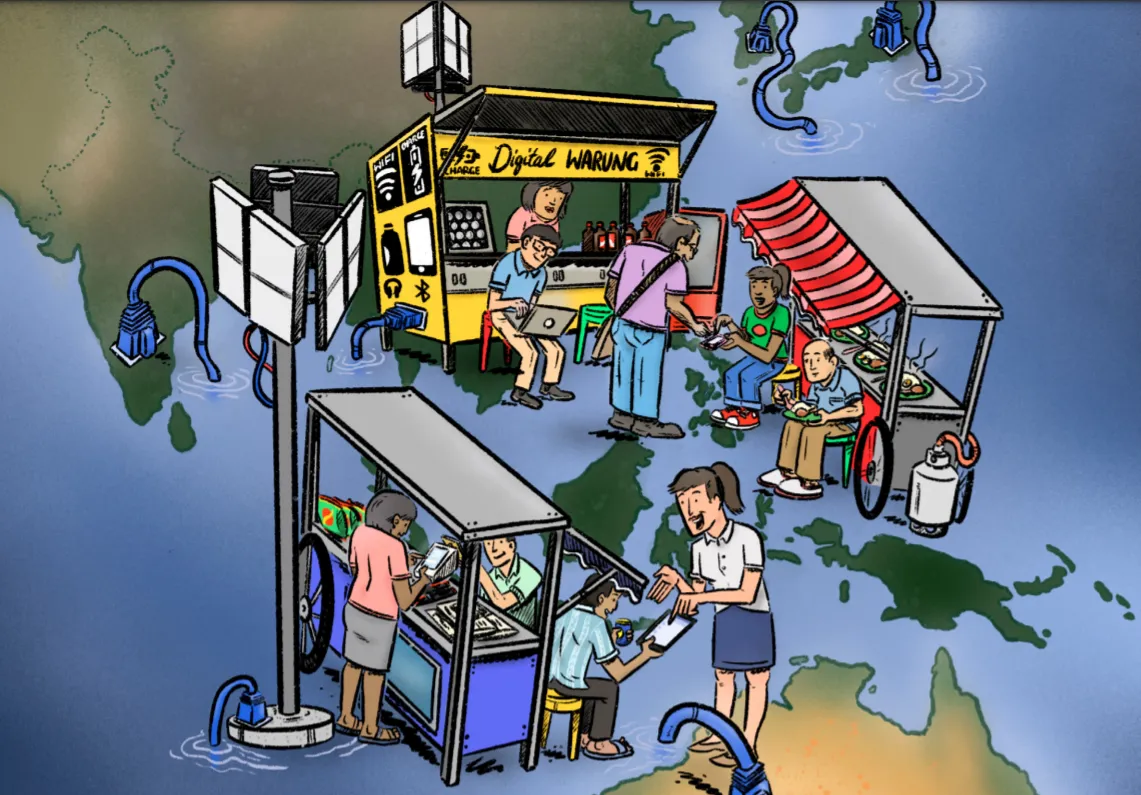-
CENTRES
Progammes & Centres
Location
The accelerated digital transformation has provided India and Australia with ample opportunities to work together and in collaboration with other like-minded countries on multiple fronts

The COVID-19 pandemic has accelerated digital adoption and digital transformation in many regions of the world. In Southeast Asia, this has driven unprecedented demand for online services in retail, digital payments, education, and health. However, the past two years have shown that not all consumers and businesses have the means to capitalise on the pandemic-induced digital transformation opportunities. In fact, the pandemic has caused a widening of the digital divide as communities and businesses must rely on digital tools for their lives and livelihoods, even in the absence of sufficient access and supporting skills.
Women have been similarly disproportionately affected, since many are employed in the informal and ‘gig economy’ sectors.
Specifically, micro-, small, and medium enterprises (MSMEs) without the means to adopt digital technologies, such as using e-platforms or engaging in digital transactions, were hard hit by the lockdowns. Women have been similarly disproportionately affected, since many are employed in the informal and ‘gig economy’ sectors. In addition, the pandemic has further exposed more users to cybersecurity and online safety risks in an environment where practices of cyber hygiene are generally poor.
For the many fragile democracies in the Indo-Pacific, this is creating conditions that could undermine democratic resilience. A central question for these governments is how to drive accelerating digital transformation and ICT-enabled growth to reduce poverty, support sustainable economic growth, and build social cohesion while maintaining resilience to cybersecurity threats.
How Southeast Asian governments, in collaboration with industry and civil society, harness their collective strengths and forge new partnerships today will determine the shape of the next phase of their digital transformation.
The digital development, cybersecurity, and inclusivity challenges facing the Southeast Asian economies are equally relevant for Australia and India.
Over the past few years, India and Australia have been driven more closely together by the Chinese state’s increasingly assertive and disruptive behaviour across several domains, particularly in cyberspace and emerging technologies. New Delhi and Canberra are displaying increasing political willingness to work together on several fronts, including on cyber and technology issues, both bilaterally and within the Quad framework with Japan and the US.
India and Australia have been driven more closely together by the Chinese state’s increasingly assertive and disruptive behaviour across several domains, particularly in cyberspace and emerging technologies.
This can also be seen in Southeast Asia, where China’s increasing influence and the geopolitical consequences of its technology push in the region have made India and Australia appreciate the need to engage more proactively with the region across multiple domains, including cyber and critical technologies.
There are ample opportunities for these two emerging technology partners, in collaboration with the Southeast Asian nations, to support Southeast Asia’s economic recovery. This community of common interest in a free, open, and prosperous Indo-Pacific can, in partnership, strengthen the foundations for an inclusive and thriving digital economy, and provide greater diversity of sources of support for digital development in Southeast Asia.
In our new report, Digital Southeast Asia: opportunities for Australia–India cooperation to support the region in the post-Covid-19 context, jointly produced by ASPI and the Observer Research Foundation, we explore opportunities for common activities that could collectively benefit Southeast Asia, Australia, and India. We consider what efforts can be made by an Australia–India collaboration to support Southeast Asia's digital capacity and resilience and the growth of the Southeast Asian digital economy in the aftermath of the COVID-19 pandemic.
The report finds that the main area of attention when considering the role of digital development in the region’s post-COVID economic recovery is the need to unreservedly address digital skills shortages. Those shortages are particularly pronounced amongst traditionally under-resourced segments of the economy, such as MSMEs, women, and those in non-metropolitan areas.
The report provides recommendations that draw on the strengths and experiences of Australia and India and fall into four areas: Streamlining the two governments’ approaches to digital engagement with Southeast Asia; augmenting local efforts to improve the digital and business skills of the regional workforce, with a focus on MSMEs, female digital entrepreneurs and non-metropolitan economic centres; strengthening and deepening policy, resource and experience-sharing relationships with Southeast Asia’s national cybersecurity agencies to improve cybersecurity resilience; and exploring a regional open-source marketplace for public digital infrastructure.
Read full report here.
The views expressed above belong to the author(s). ORF research and analyses now available on Telegram! Click here to access our curated content — blogs, longforms and interviews.

Huon Curtis is an Analyst and Project Manager with ASPIs International Cyber Policy Centre.
Read More +
Bart Hogeveen is Head of Cyber Capacity Building at ASPIs International Cyber Policy Centre.
Read More +
Jocelinn Kang is a Program Manager &: Technical Specialist at ASPIs International Cyber Policy Centre.
Read More +
Dr Rajeswari (Raji) Pillai Rajagopalan was the Director of the Centre for Security, Strategy and Technology (CSST) at the Observer Research Foundation, New Delhi. Dr ...
Read More +
Trisha Ray is an associate director and resident fellow at the Atlantic Council’s GeoTech Center. Her research interests lie in geopolitical and security trends in ...
Read More +